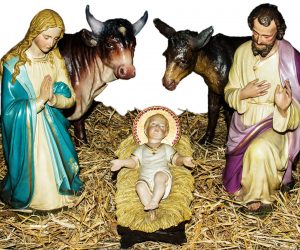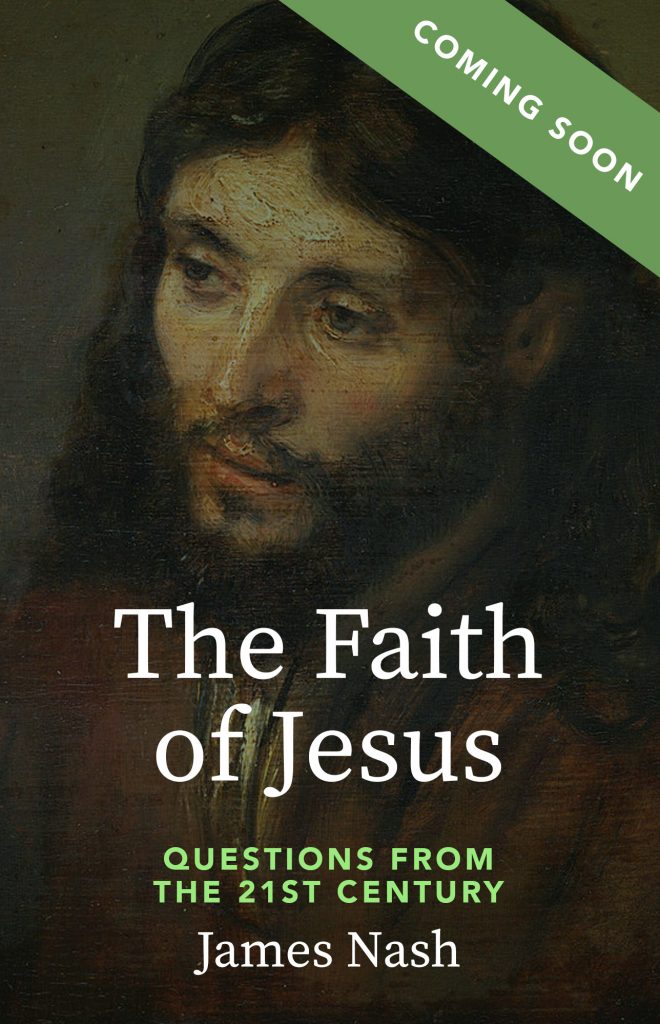Christmas Mass at Midnight
The Feast of the Incarnation
Isaiah 9:1–6
2 Timothy 2:11–14
Luke 2:1–14

Image by Hans Rohmann from Pixabay
The readings for this Mass are quite familiar to anyone with even a little exposure to Christianity. Luke is a masterful storyteller, and his gifts never shine more brightly than in the portrait he paints of Jesus’s birth. Maybe he is too good, so good that we can be distracted by the details—the baby Jesus lying in a manger, the shepherds—and lose sight of the central mystery of this feast: the Incarnation.
Before examining this mystery, however, I do want to spend a little time thinking about verses 8–14. God puts on quite a show for these shepherds! First an angel appears, announcing the birth of Jesus, then “a throng of the heavenly army, praising God and saying, ‘Glory to God in the highest places and peace on earth among men of good will.’”
Wouldn’t you have loved to see this heavenly army? This extraordinary revelation of God’s glory does not happen every day. What I find most extraordinary about it is that God chose to reveal it to shepherds. Shepherds, in Jesus’s time as well as our own, are close to the bottom of the social-economic-religious-educational hierarchy. You do not have to go to school to learn how to be a shepherd. It is not going to make you rich. You spend lots of time sleeping outside with animals.
Why did God choose to reveal God’s glory to shepherds? If you go to all this trouble with angels and the heavenly army, would you not want it to have the maximum impact? That would mean showing this display to people in a large city. Who is going to believe the reports of a few low-class shepherds? People will say they were dreaming or hallucinating after spending too much time outside with the sheep.
Yet that is precisely in line with all the other details of Jesus’s birth. The glory is covered—and magnified—by humility. Jesus’s birth resembles his death in this way; the transcendent power of the event is heightened, not lessened, by human vulnerability and lowliness.
The majority of Scripture scholars are dubious about the details of Jesus’s infancy narratives. It is precisely because Jesus was born to a simple, humble family that we do not know very much about his birth. If he had been born an earthly king, we would know far more.
What we do know is really all we need to know. Jesus, the Son of God, the Incarnation of the Word, the second person of the Trinity, was born in humble circumstances to Mary and her husband, Joseph. This is the mystery of Christmas. I prefer to call it the Feast of the Incarnation because Christmas has become so wrapped up in cultural, even commercial, phenomena that obscures this fundamental truth.
This is one reason why the Christmas season lasts more than two weeks for Catholics, from Christmas Day to the Feast of the Baptism of the Lord. We need at least that much time to enter into this mystery. I do not believe a lifetime is long enough to come to grips with it!
As I mentioned in my introduction, I think most Christians struggle to believe Jesus is both fully human and fully divine. If we conceive of Jesus’s humanity and divinity as always somehow at odds with one another—as if the more human he is, the less divine he is—we will not get very far in grappling with this mystery. Logically, rationally, there is a conflict between the two, but the mystery of the Incarnation transcends logic. It points to a deeper truth about the nature of both humanity and divinity.
Medieval theologians asked why God waited so long after Adam’s Fall to send us the Redeemer. The first reading from Isaiah offers one answer. The Old Testament prophets gave voice to the deep longing in the human heart for a savior, for someone who will redeem us from the apparent futility and pointlessness of human life: birth, school, work, death. Perhaps it took us a while to understand that we cannot make sense of this life and this world unless someone who utterly transcends it comes to help us. This is another reason why Jesus needs to be both fully human and fully divine.
The reading is apt because it is so dark this time of year in the northern hemisphere. It is now easy to be in touch with the lonely emptiness of our death-doomed lives. One exercise I do during Advent is to imagine what my life would be like if I knew nothing of Jesus. Bleak despair, especially this time of year! So, thank God for the Feast of the Incarnation. But it is not easy to swallow.
Christians are asked to believe quite a number of things that “strain credulity,” as my sister likes to say. The virgin birth, Jesus’s many miracles, like walking on water, the Resurrection. Still, the hardest doctrine of all has got to be the Incarnation. If we can believe Jesus is true God and true man, everything else is easy to believe,
What we believe is important. Jesus repeatedly emphasized the importance of having faith. However, the power of God’s truth does not depend solely on what we believe or think we believe. And this makes me hope that we all may believe in the truth of the Incarnation after all.
I am referring to the gradual growth, since the time of Jesus, in our recognition of the dignity, the transcendent value, of every human being. This was not a common view in Jesus’s time: the Romans enjoyed watching wild beasts devour human beings; slaves were often not regarded as fully human; the practice of crucifixion existed; and so on.
The belief that God took human form, and especially such a humble one, means that all humans have a certain dignity. Our culture and our economy do not always honor this dignity. Some cultures do better at this than others. We clearly have a long, long way to go in respecting the dignity of all human persons. But it seems to me that when someone’s human dignity is violated—by sexual abuse, violence, a violation of human rights—in the twenty-first century, it bothers us. It gives us a guilty conscience. We know something is wrong.
I do not believe this was true before Jesus. I do believe it is one of the truths of the mystery of the Incarnation that is going to affect us whether we like it or not, whether we believe it or not. Thank God!
A second truth of the Incarnation is that Jesus is God’s Word for us. If God took human form, it must mean God is telling us something about how our Creator intends for us to live. When you buy a product, the maker of it will send you an owner’s manual telling you how to operate and care for it.
Since God created us and then took on our human flesh, it must mean that God is telling us, “This is what I made you for. This is how you are to live to fulfill your human nature.” Jesus came, in other words, partly to show us how to live, think, and feel. Sometimes the teaching is clear, especially in St. Matthew, God bless him! We get to spend a lot of time with him because it is Year A. But often Jesus’s message is more complicated or indirect and requires digging to uncover.
In the meditations on the lectionary that follow, I will be trying to discern the message implicit in the Incarnation: God is telling us how to live the life God has so lovingly given us. Merry Christmas!



A current political question is raised by the question of the Incarnation. When did Jesus incarnate? When Mary was visited by the angel? When Mary “conceived”? At some point in Mary’s pregnancy, for instance at 6 weeks when a fetal heartbeat begins to sound? At birth? A lot of people would like the answer to this question. If Jesus was not in the world at conception, then perhaps neither are any of us. Yet, conception is not, medically speaking, when the egg and sperm unite to form a
potentially viable being, the zygote. It seems the Catholic church assumes that spirit enters flesh at conception; otherwise, abortion and birth control methods that interfere with fetal implantation wouldn’t be forbidden for Catholics. Is spirit present in every cell of flesh, including the half-cells (which could not survive on their own) that come together to form an embryo?